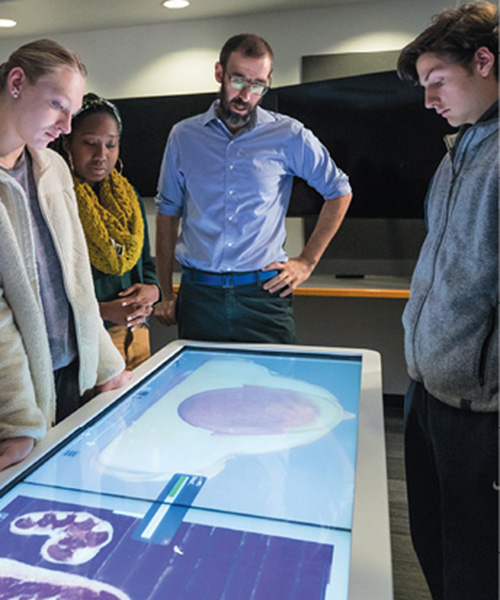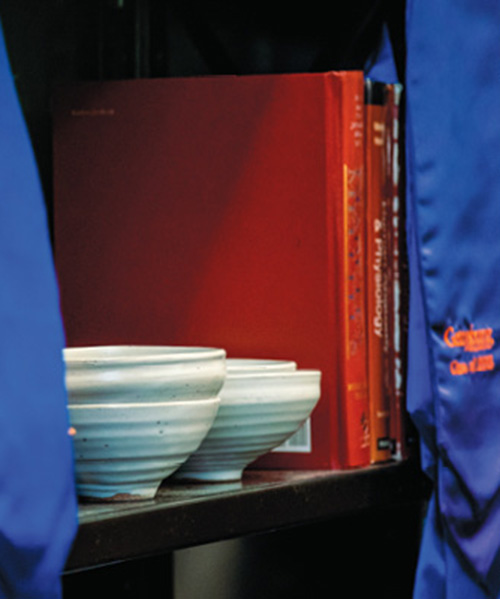
White-clay mugs accented with flecks of iron and sculpturally shaped bowls beckon the eye to see and the hands to touch. Handcrafted by Health Sciences Prof. Josef Brandauer, these humble objects, like the clay that composes them, are forged with dedication and trust throughout their making. It’s how Brandauer approaches his hobby and his profession at Gettysburg College, one thatwas inspired by first finding answers to his own questionsabout physiology.
Brandauer entered the University of Maryland for his graduate studies with the idea that he wanted to coach competitive cyclists. After receiving his doctorate in exercise physiology in 2005 and completing his postdoctoral research at Joslin Diabetes Center in Boston, he thought about how his professional passion for physiology intersected with working with undergraduate students. “I love teaching, and I receive so much professional satisfaction from being helpful,” he said.
While in Boston, Brandauer discovered a faculty position had opened at Gettysburg College. He applied and was welcomedto campus for an in-person interview and teaching observationin 2008.
“I taught anatomy and physiology in two sections first thing in the morning and loved it,” he recalled. “I met with [President Emerita] Janet Morgan Riggs ’77, who was the provost at the time, and she laid out the mission of what we do and why we’re here so clearly that I could identify myself with it immediately.I was sold on the job right there.”
Today, with more than 15 years of teaching at Gettysburg, Brandauer believes Gettysburg has made him a better scientist because of the diverse breadth and depth of knowledge he and his students encounter in his courses.
“In anatomy and physiology, I’m there for my students during that discovery stage, and I see them make sense of how the human body works. It’s a wonderful opportunity to be a part of that. I also teach an upper-level cardiorespiratory physiology class, and there we are diving deep and thinking in complicated, detailed ways,” he explained.
Brandauer also recognizes the importance mentorship plays in the lives of students new to Gettysburg and whose families are new to higher education. Guiding students along their academic pathways reflects his philosophy of being helpful through his work.“I had almost no preparation going to college, and it was mainly so difficult because I didn’t have support from my professors,” he explained. “You cannot be an excellent teacher if you’re not genuinely opening your classroom to all your students, no matter where they’re from or their academic backgrounds.” Brandauer is especially proud to have won the College’s undergraduate mentoring award. He also directs the College’s Howard Hughes Medical Institute grant on Inclusive Excellence.


In 2020, Brandauer accepted the offer to direct The Johnson Center for Creative Teaching and Learning (JCCTL) at Gettysburg, a position he held for the past four years. Established in 2011 after Gettysburg received a challenge grant from the Christian A. Johnson Endeavor Foundation, the JCCTL serves Gettysburg faculty by providing opportunities to develop their teaching skills, explore collaborative and experiential learning techniques, and foster innovative, inclusive, and evidence-based pedagogical instruction.
As the director, Brandauer supportedhis colleagues in confronting the challenges of academic instruction amid the COVID-19 pandemic and helping the College community navigate the ever-evolving nuances of generative AI (genAI). Brandauer believes that theway to promote teaching excellence isby advancing inclusive teaching.
Brandauer reflected on the JCCTL’s accomplishments and attributes his success to the strength of collaboration with colleagues from all areas of our campus community. To extend his gratitude to those who collaborate with him to lift up the JCCTL’s work, he gives them the clay mugs and bowls he handcrafts in Gettysburg’s pottery studio alongside students and under the guidance of Art and Art History Prof. Tina Gebhart. It’s a token of appreciation he extends to acknowledge the time and energy people invest in helping our students succeed.
For Brandauer, tokens of appreciation are delivered to him by students who have presented him with their Stoles of Gratitude during Commencement.These Stoles remind him of the manylives touched by those for whom he has served as a teacher, a mentor, and a champion for all that they are and forall they will become.
by Michael Vyskocil
Posted: 07/16/24